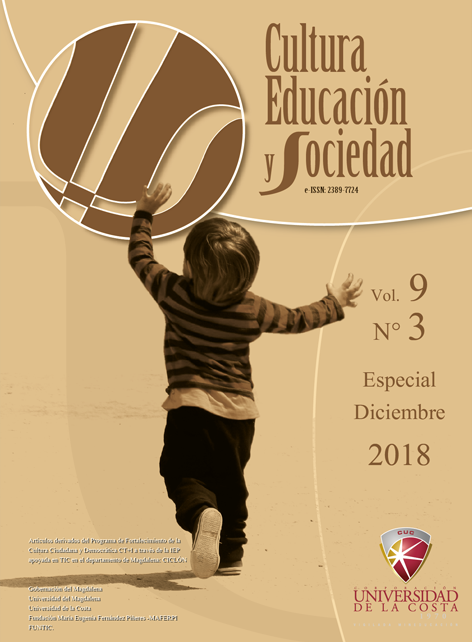Information and communication technologies as strategies to strengthen the Interpretation and production of texts
DOI:
https://doi.org/10.17981/cultedusoc.9.3.2018.74Keywords:
Improvement in the interpretation and production of texts in students, curricular integration of the IEP supported in ICT.Abstract
The interpretation and production of texts has always been a topic of great research interest at the national level, due to the problems associated with the low results obtained in the different tests established. Based on this, the purpose of the research is aimed at strengthening students' interpretive and productive competence in texts through information and communication technologies. It assumes a methodological approach from qualitative research, oriented from the action research. The analysis unit consisted of 132 students of grades 4 and 5, between the ages of 0 to 19 years, which make up the different venues of the IED Farming Our Lady of Mercy.
The results thrown away showed that by working on issues related to the interpretation and production of texts, a significant increase in the students' academic results was generated; delivering quality products in content and textual interpretation.
Downloads
References
Cerda, H. (1997). La investigación total. Cooperativa Editorial Magisterio. Bogotá́, Colombia.
Crissien, T., Reyes, J., Herrera, B., Herrera, K., Franco, M., y Avendaño, I. Ruta Metodológica para introducir la investigación como estrategia pedagógica - IEP apoyada en TIC en el currículo. Recuperado de: https://es.scribd.com/document/327483212/CARTILLA-Apropiacion-Del-Programa-Ciclon-2.
Henao, C. (2016). Las TIC: estrategia para mejorar la competencia lectora-interpretativa en el área de lenguaje. Revista Universidad Católica Luis Amigó, 1, pp. 126-148. DOI: Extraído de https://doi.org/10.21501/25907565.2653
Henao, O. (2006). Evidencias de la investigación sobre el impacto de las tecnologías de información y comunicación en la enseñanza de la lectoescritura, Revista
Educación y Pedagogía, Medellín, Universidad de Antioquia, Facultad de Educación, vol. XVIII, núm. 44.
Hernández, R; Fernández, C & Baptista, P. (2012). Metodología de la investigación. México, D.F.: McGraw-Hill Education.
ICFES. Resultados de pruebas saber Pro. Recuperado de: http://www2.icfesinteractivo.gov.co/ReportesSaber359/consultaReporteEstablecimiento.jspx
Marin, F; Niebles, M; Sarmiento, M & Valvuena, S. (2017). Mediación de las tecnologías de la información en la comprensión lectora para la resolución de problemas aritméticos de enunciado verbal. Revista Espacios. ISSN 0798 1015Vol. 38 (Nº 20)
Marqués, P. (2006). El papel de las TIC en el proceso de lectoescritura. México: Editorial Planeta, Grandes Publicaciones.
Martínez, O; Salgado, M; Cantillo, M, & Prada, E. (2015). Interpretando textos a través de las tic: Una propuesta pedagógica para los estudiantes de grado cuarto de básica primaria de la Institución educativa Olga González Arraut . Tesis Doctoral. Universidad de Cartagena.
Martos, F. (1994). La producción de texto: un método eficaz para reforzar competencias lingüísticas. In Actas del Segundo Congreso Nacional de ASELE: español para extranjeros: didáctica e investigación: Madrid, del 3 al 5 de Diciembre de 1990 (pp. 143-148).
Material para maestros. Formato de registro de lectura [Mensaje en un Blog]. Recuperado de: http://materialparamaestros.com/formato-de-registro-de-lectura/
Miranda, N; Muñoz, M; Porras, L; Ramírez, D. (2006). Las TICS, nuevas alternativas en la superación de las dificultades en el aprendizaje escolar. Medellín: Universidad de Antioquia.
Patiño Builes, A. (2015). Tendencias tecnológicas que influyen en el aumento de la productividad empresarial. INGE CUC, 11(2), 84-96. https://doi.org/10.17981/ingecuc.11.2.2015.09
Piacente, T., & Tittarelli, A. M. (2006). Comprensión y producción de textos en alumnos universitarios: la reformulación textual. Orientación y sociedad, 6, 99-126.
Sáez, J. M., (2011) Utilización eficaz y actitudes que muestran los docentes en la aplicación de las tecnologías de la información y comunicación en educación primaria. Tesis doctoral. Universidad Nacional de Educación a Distancia. Madrid, España.
S
pina, M., Rohvein, C., Urrutia, S., Roark, G., Paravié, D., & Corres, G. (2016). Aplicación del modelo SCOR en pymes metalmecánicas de Olavarría. INGE CUC, 12(2), 50-57. https://doi.org/10.17981/ingecuc.12.2.2016.05
Talavera, R y Marín, F (2015) Recursos tecnológicos e integración de las ciencias como herramienta didáctica. Revista de Ciencias Sociales RCS 21 (2), 337 - 346
Villalobos, M., Gómez, M., y González, L. (2013). Promoción de la escritura creativa a través de talleres apoyados con tecnologías digitales en escuelas uni-docentes. Revista Q, 8 (15), 1-19.
Downloads
Published
How to Cite
Issue
Section
License
Copyright (c) 2018 CULTURA EDUCACIÓN Y SOCIEDAD

This work is licensed under a Creative Commons Attribution-NonCommercial-NoDerivatives 4.0 International License.
![]()
Creative Commons 2020 CULTURA EDUCACIÓN Y SOCIEDAD
This article is under international license Creative Commons Reconocimiento-NoComercial-SinObrasDerivadas 4.0.
The published articles are the sole responsibility of their authors and do not necessarily reflect the opinions of the editorial committee.
CULTURA EDUCACIÓN Y SOCIEDAD respects the moral rights of its authors, who assign to the editorial committee the patrimonial rights of the published material. In turn, the authors inform that this work is unpublished and has not been previously published.
All articles are under a:
Licencia Creative Commons Atribución-NoComercial-SinDerivadas 4.0 Internacional.
![]()


 English
English
 Español (España)
Español (España)




_12.53_.27_p_. m_._3.png)





_12.57_.35_p_. m_._3.png)
_12.50_.37_p_. m_._3.png)



